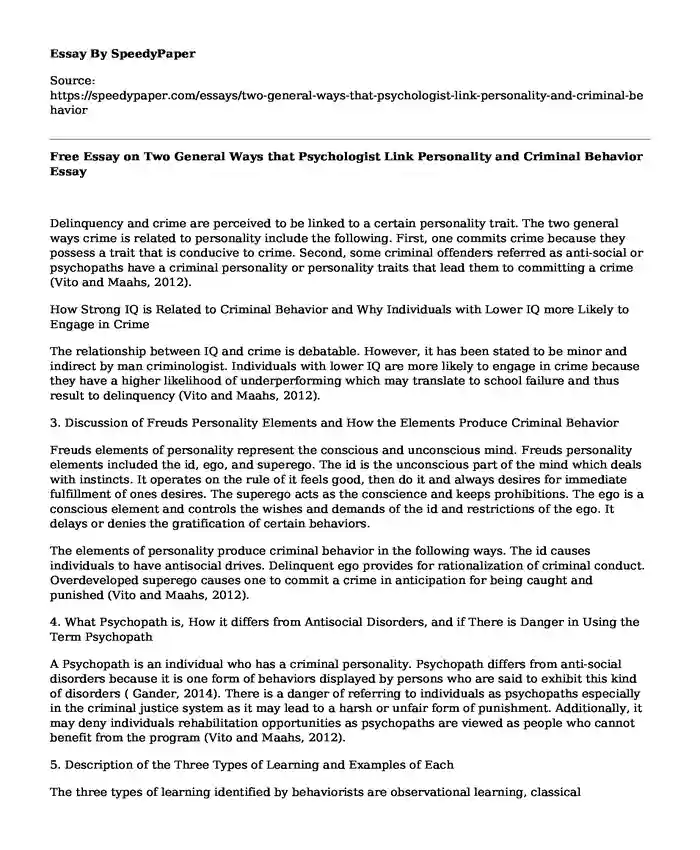
| Type of paper: | Essay |
| Categories: | Psychology Criminal law Personality |
| Pages: | 3 |
| Wordcount: | 669 words |
Delinquency and crime are perceived to be linked to a certain personality trait. The two general ways crime is related to personality include the following. First, one commits crime because they possess a trait that is conducive to crime. Second, some criminal offenders referred as anti-social or psychopaths have a criminal personality or personality traits that lead them to committing a crime (Vito and Maahs, 2012).
How Strong IQ is Related to Criminal Behavior and Why Individuals with Lower IQ more Likely to Engage in Crime
The relationship between IQ and crime is debatable. However, it has been stated to be minor and indirect by man criminologist. Individuals with lower IQ are more likely to engage in crime because they have a higher likelihood of underperforming which may translate to school failure and thus result to delinquency (Vito and Maahs, 2012).
3. Discussion of Freuds Personality Elements and How the Elements Produce Criminal Behavior
Freuds elements of personality represent the conscious and unconscious mind. Freuds personality elements included the id, ego, and superego. The id is the unconscious part of the mind which deals with instincts. It operates on the rule of it feels good, then do it and always desires for immediate fulfillment of ones desires. The superego acts as the conscience and keeps prohibitions. The ego is a conscious element and controls the wishes and demands of the id and restrictions of the ego. It delays or denies the gratification of certain behaviors.
The elements of personality produce criminal behavior in the following ways. The id causes individuals to have antisocial drives. Delinquent ego provides for rationalization of criminal conduct. Overdeveloped superego causes one to commit a crime in anticipation for being caught and punished (Vito and Maahs, 2012).
4. What Psychopath is, How it differs from Antisocial Disorders, and if There is Danger in Using the Term Psychopath
A Psychopath is an individual who has a criminal personality. Psychopath differs from anti-social disorders because it is one form of behaviors displayed by persons who are said to exhibit this kind of disorders ( Gander, 2014). There is a danger of referring to individuals as psychopaths especially in the criminal justice system as it may lead to a harsh or unfair form of punishment. Additionally, it may deny individuals rehabilitation opportunities as psychopaths are viewed as people who cannot benefit from the program (Vito and Maahs, 2012).
5. Description of the Three Types of Learning and Examples of Each
The three types of learning identified by behaviorists are observational learning, classical conditioning, and operant conditioning learning. Classical conditioning learning draws a relationship between a stimulus and response. An example of this learning is that of pairing a bell with food for a dog. The dog will later learn to associates the bell with food. Operant conditioning learning is based on reinforcement of target behavior while a negative behavior is punished. For instance, when a child lies, they are punished and whenever they tell the truth, they are rewarded. Observational learning focuses on learning through observation. An example of this type of learning is watching of Bobo doll a videotape which involves punching of dolls. When children observe the tape, they are more likely to imitate later the actions they saw while watching (Vito and Maahs, 2012).
6. Discussion on Two Rehabilitation Programs Used by Behaviorists and Type of Learning Used
The types of rehabilitation programs used by behaviorist include aversion therapy and token economy. Aversion therapy delinks the troublesome behavior and the stimuli. It pairs a pleasurable stimulus with a noxious one simultaneously to enhance the unlearning of the behavior. On the other hand, token economy involves earning token depending on behavior displayed (Vito and Maahs, 2012).
The types of learning used by behaviorist are classical conditioning and operant conditional learning (Vito and Maahs, 2012).
References
Gander, K. (2014). The difference between psychopaths and anti-social people lies in brain activity, experts claim. Retrieved from http://www.independent.co.uk/news/science/the-difference-between-psychopaths-and-anti-social-people-lies-in-brain-activity-experts-claim-9683631.html
Vito, G., and Maahs, J. (2012). Criminology: Theory, Research, and Policy. Sudbury, Mass: Jones & Bartlett Learning.
Cite this page
Free Essay on Two General Ways that Psychologist Link Personality and Criminal Behavior. (2019, Oct 31). Retrieved from https://speedypaper.net/essays/two-general-ways-that-psychologist-link-personality-and-criminal-behavior
Request Removal
If you are the original author of this essay and no longer wish to have it published on the SpeedyPaper website, please click below to request its removal:
- Essay Example on an Independent Regulatory Agency
- Free Essay on Effects of Travel and Tourism on GDP
- Free example on Personal Goal Statement, Psychiatric Nurse Practitioner Program
- Free Paper Sample on Implications of Summer 2020 Olympic Games in Tokyo, Japan
- Tata Nano: The People's Car
- Paper Example: Government Budget Paper
- Essay Example - Humans/ Post-Modernism/ Philip Glass
Popular categories




